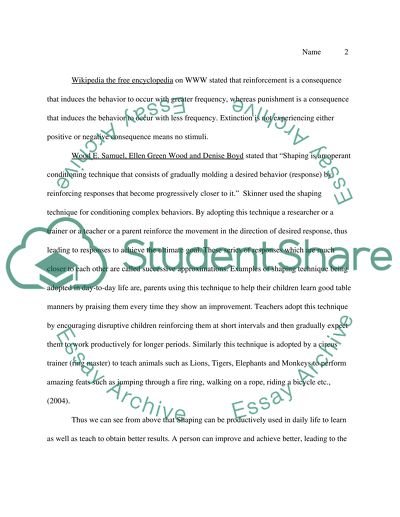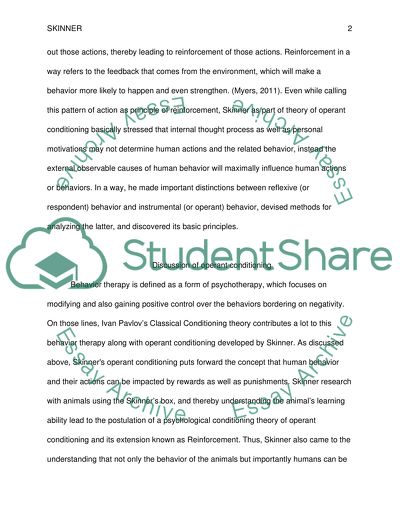
Operant Conditioning - Essay Examples and Topic Ideas According to Ney () operant conditioning is a type of knowledge in which the power of an answer is resulted by the stimulus that follows. The condition is based under the reinforcement wanted versus no reinforcement for unwanted reactions Operant Conditioning Essay. A behavioural psychologist believes that human behaviours can be explained and modified in terms of conditioning, without considering thoughts or feelings. Behaviourists emphasise the relationship between the environment and behaviour. This is called focus on learning, which is the changes in behaviour that can happen because of an experience Essay On Operant Conditioning. Operant Conditioning is a method of learning that occurs through rewards and punishments for behaviour. In other words, a response that is followed by a reinforcing stimulus has a larger chance to occur again. Operant conditioning has been studied by many behaviourists
Operant Conditioning Strategies: Positive Reinforcement - Words | Essay Example
We use cookies to enhance our website for you. Proceed if you agree to this policy or learn more about it. Type of paper: Essay. Topic: PsychologyOperant ConditioningPunishmentCriminal JusticeFoodLearningCrimeBehavior. Pages: 5. Operant conditioning essay The definition of operant conditioning is a form of learning in which reinforcement increases the probability of a response. A response that is followed by a reinforcing stimulus is more likely to reoccur. Operant conditioning is explains much day-to-day behavior. Every individual lives his or her life according to the reinforcement they receive after performing an action. Operant conditioning deals with reinforcement and the strengthening of behaviors.
Individuals are cognizant and make voluntary responses based on consequences. Operant conditioning involves two parts: reinforcer and reinforcement. Reinforcer is stimuli that increase the chances of the same recurring response. Reinforcement is the act of following a response with a reinforcer. Operant conditioning differs from classical conditioning. He or she actively operates on the environment to bring about reinforcement, operant conditioning essay. In classical conditioning, however, the individual is operant conditioning essay and the response is involuntary. Skinner, the American psychologist most commonly associated with the scientific study of operant conditioning, used the Operant Conditioning Chamber, a device called a Skinner box, to study operant behavior, operant conditioning essay.
For example, when a rat pulled a lever, he would receive food. As a result, the rat would repeatedly pull on the lever. In What is Psychology? There are different categories and types of reinforcement. Primary reinforcers are consequences that satisfy a biologically built-in need, such as food, shelter and oxygen. Secondary reinforcement—also known as conditioned reinforcement—refers to a situation in which a stimulus reinforces a behavior operant conditioning essay it has been associated with a primary reinforcer. These examples are more complex than primary reinforcers. Money can be used to reinforce behaviors because it can be used to acquire primary reinforcers. Consequences such as praise and feelings of success are also secondary reinforcers, operant conditioning essay.
There are also extrinsic and intrinsic reinforcers. Extrinsic reinforcers come from the outside environment and are often visible or tangible, such as praise, money and accolades. This includes the love of participating in an activity or the joy that comes from learning something new. Physical activity is an example of both extrinsic and intrinsic reinforcement. If a person exercises to change their appearance, such as becoming slimmer or more muscular, they are being reinforced extrinsically. However, if that individual exercises to simply reap the benefits of increased energy, higher levels of endorphins and overall happiness, this is intrinsically reinforced.
There are different types of reinforcement. Positive reinforcement is a reinforcing consequence that increases the likelihood of the behavior. These can include food, praise, money and intrinsic reinforcement. Negative reinforcement is the strengthening of a behavior because something negative or unpleasant is removed from the situation, or the situation is escaped or avoided. For instance, leaving the house early to avoid getting stuck in traffic and being late for work is an example of negative reinforcement. By eliminating undesirable outcomes, the preventative behaviors become more likely to occur again in the future. Therefore, both positive and negative reinforcement strengthen the behavior. In positive reinforcement, a stimulus is presented. In negative reinforcement, however, a stimulus is removed.
Negative reinforcement is often wrongly confused with punishment. Punishment is a consequence that lessens the probability of the response it follows. This can involve the presentation of undesirable stimulus, such as a classroom teacher giving a student more operant conditioning essay as punishment for bad behavior. It can also involve the removal of pleasant stimulus, such as a student losing recess privileges because they failed to turn in their homework. Positive and negative reinforcement strengthen behaviors and responses, whereas punishment acts to decrease a response. Positive punishment adds something to decrease behavior, while negative punishment removes something to decrease behavior.
Punishment should therefore be avoided because it does not promote or teach desired behaviors. Negative reinforcement seems to be the most efficient at causing necessary change in an individual. For example, if an individual tends to indulge in unhealthy foods, negative reinforcement could cause him or her to have to pay five dollars operant conditioning essay every item of junk food consumed. This would quickly escalate into the individual being highly resistant to doling out dollar after dollar for each muffin, candy bar, operant conditioning essay, or soda. The individual could very easily end their addiction to unhealthy food. Negative reinforcement, however, cannot sustain results. Long-term, negative reinforcement does not instill a sense of accomplishment or positive emotion.
In fact, in the context of unhealthy foods, one might grow an even unhealthier resentment towards food in general. This could operant conditioning essay into even greater addiction, or worse, extreme restriction. In the end, positive reinforcement stands as the most steadfastly effective method in not only achieving optimal behavior but also an ideal attitude. For example, instead of being charged five dollars and not eating junk food in order to avoid having to pay the fee, positive reinforcement would replace the junk food with balanced meals operant conditioning essay with both intrinsic and extrinsic reinforcers, such as a more taut body, compliments from friends and family, and an increased sense of well-being due to more nutritious foods.
This provides not only beneficial behavior but also instills a spirit of operant conditioning essay within the individual. Positive reinforcement is crucial in maintaining healthy relationships, particularly romantic ones. If a man is negatively reinforced into behavior that the woman desires, he will soon become resentful of the tacit manipulation and control. A woman may deny intercourse to a man if a he does not take her out to dinner every week. In order to avoid this, a man may find himself feeling increasingly unhappy about the fact that he has to take the woman out to dinner every week in order to sustain the physical part of their relationship. Though effective, the heart with which the man performs the desired behavior is not ideal.
If the woman were to, on the other hand, praise the man each time he does something well, operant conditioning essay, he would feel more likely to repeat that act. If she were to appreciate him again and again, he would feel increasingly uplifted and therefore self-propelled in his generous actions towards his partner. The reinforcement schedule that would create a loving, harmonious relationship would involve a conscious practice of gratitude and appreciation towards the other, recognizing even small efforts on their part. Rather than avoiding a consequence by increasing behavior, one is encouraged to practice certain behavior because operant conditioning essay the positive emotions stirred up within. There is no strain, pressure, tension, operant conditioning essay, manipulation, or stress.
This would undoubtedly secure an ideal, free-flowing relationship. Coon, Operant conditioning essay. Introduction to Psychology: Gateways to Mind and Behavior. Belmont, California: Operant conditioning essay Cengage Learning. Pastorino, E. What is Psychology? Boyd, C. Consumer Psychology. Maidenhead: Open University Press. Note: this sample is kindly provided by a student like you, use it only as a guidance, operant conditioning essay. ID Password recovery email has been sent to email email. HIRE WRITER Sign in. HIRE WRITER. Who We Are Contact Us Our Writers Our Guarantees How It Works FAQ Honor Code WowEssays Reviews Blog Our Services, operant conditioning essay.
ORDER PAPER LIKE THIS. References Coon, D. Cite this page Choose cite format: APA MLA Harvard Vancouver Chicago ASA IEEE AMA. Accessed 18 April Essay On Operant Conditioning. March Accessed April 18, Retrieved April 18, com, Mar Free Essay Examples - WowEssays. Published Mar 22, Share with friends using:. Removal Request.
Operant Conditioning Ethics Mart 329 Visual Essay
, time: 9:59Free Operant Conditioning Essays and Papers | Help Me

Operant conditioning is a term used to refer to behaviour modification that is attained through a response-reward system. The major assumption (which happens to be true) is that human beings behaviour can be conditioned through a reward system. The reward may be positive, which reinforces a positive behaviour, may be negative which discourages a certain negative behaviour Essay On Operant Conditioning. Operant Conditioning is a method of learning that occurs through rewards and punishments for behaviour. In other words, a response that is followed by a reinforcing stimulus has a larger chance to occur again. Operant conditioning has been studied by many behaviourists Operant conditioning is a type of learning that is used to increase or decrease the frequency of a behavior by associating a consequence with the behavior. Consequences of a behavior can help change and shape the type of behavior
No comments:
Post a Comment